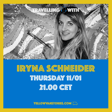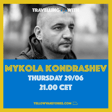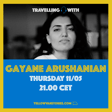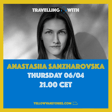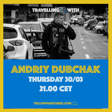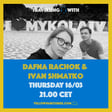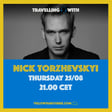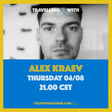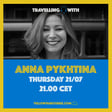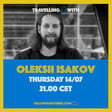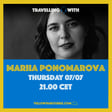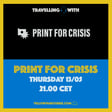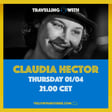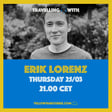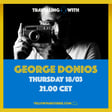Introduction to Yellow Van Stories
00:00:17
Speaker
When you relate, you begin to care and when you care, you take action. Hello and welcome to a new episode of the Yellow Van Stories, your interview podcast taking you across the globe in a yellow French campervan by the name of Fonzie.
Bastian welcomes listeners to a special episode
00:00:38
Speaker
I'm your host and driver Bastian.
00:00:42
Speaker
Today we come to you with a very special episode with a lot of firsts. For the very first time we are more than four people in the van, including you of course, and for the very first time we'll be doing some dubbing for one of our very special guests today to add a little more let's say cultural spice, because after all you're a travel podcast, right?
00:01:07
Speaker
and for the very first time as well we dedicate an entire episode to one single topic.
Exploring marginalized communities
00:01:14
Speaker
Today's topic is very close to Vicky's and my heart and we couldn't be happier to be on the road with the very inspiring people we have on board today but whose work and reality is unfortunately all too often marginalized and stigmatized.
Journey to Greece and STEPS initiative
00:01:30
Speaker
Why that is the case and how we can collectively be better is one of the questions of today's show. Fonzie's in first gear already and we are good to go. So buckle up and get comfortable because today we're going to Greece.
00:01:53
Speaker
Here with us at the Yale event today are a lot of people, actually, for the very first time. We have five all together with us today is STEPS, a nonprofit initiative from Greece that deals with street connected people. They take action through street embrace, housing, and the feeling of belonging in order to support people that experience social exclusion, a topic that is very important in Greece at the moment because homeless people
00:02:20
Speaker
suffer even more now under this pandemic. So we want to talk with Tatiana, with Eleni, with Katarina, and with Kostas, one of the beneficiaries of the initiative, about what they're doing to alleviate some of the problems and how they're helping out in this very, very difficult time.
Challenges faced by homeless in Greece
00:02:41
Speaker
And additionally with us is Vicky Markoleva, who you might know from previous episodes, who with a long-standing experience with NGO work
00:02:49
Speaker
will be by my side to support with questions and with her know-how. So that was a very long introduction. I think the longest ever in the Yellow Van. So I'm very happy to have you all on board today, guys. Welcome to the Yellow Van. Thank you. Glad to hear you. I would very much like to first have maybe so that people get a bit of an idea of you. Tatiana, maybe you start. What is your role in steps?
Insights from NGO workers and coordinators
00:03:14
Speaker
What is your role? What are you doing around the initiative?
00:03:18
Speaker
So my title, if you could call it that, is to be the street work coordinator, so meaning street embrace actions when it comes to coordinating them, getting the program ready, and stuff like that. But I also participate in practically all of our projects, like the drop-in center Kukida, for whom Katarina is going to talk for, most likely.
00:03:43
Speaker
I also do lots of street work and many practical things, communications, a bunch of everything. I would say something like that. All right. You're a Swiss pocket knife, basically.
00:03:57
Speaker
In a way. Okay, great. Katarina, what about you? Can you quickly give us a bit of an overview of what you are doing? Yes, I'm the coordinator of Kukida with another girl, Zoe, that she's not here now.
00:04:18
Speaker
And I'm also active in this written race, but I'm not a coordinator there, I just participate. And just like Tatiana with...
00:04:31
Speaker
not as much as it does, but with communications also, whatever has to do with art related things. That's where I am. Yes. All right. Thank you very much. And then we still have Eleni. Hello, Eleni. What's your role with steps?
00:04:51
Speaker
Hello guys, I mostly participate in the street action and also the drop-in center and also I'm not a coordinator of those actions, I just participate and I also deal with the communication and the
00:05:14
Speaker
with the new people that are on the team. So, yeah, that's basically. All right. Wonderful. Thank you for joining us.
Experiences of Costa, a beneficiary
00:05:25
Speaker
And then we still have Costa, Yasu Costa, one of the beneficiaries of the SEBS program, Hiropoli Costa.
00:05:33
Speaker
Hi, Bastian. It's a pleasure to meet you. Yes, I feel the same. Thank you for your time today, Costa. Thank you too very much. And I hope that what we're doing today is going to be an exceptional piece of work for us and for you. Yes, indeed. Thank you very much. I would start off everything with now that we've kind of given a very quick overview of what you do.
00:06:00
Speaker
I would like for one of you maybe to paint a picture of the daily reality of homeless people in Greece at the moment, especially in Athens. Who would like to share their insight with us here? I could go over some basic things, but I think that Kostas would be the one most appropriate to give us an actual insight since this is his community and has been
00:06:26
Speaker
his reality so it's important to hear him but from our point of view just as an organization. We find that being outside is very insecure you never have a feeling of actual safety and security in.
00:06:43
Speaker
eats in every sense, physically and emotionally and psychologically, you are kicked out of where you try to sleep, which is still not a secure or appropriate spot. You go around looking for how to make money. You try to spot places where you can maybe get food, blankets, have a shower. It's like a scavenging mode, I would say, if I could describe it like that. It's just like a day that
00:07:13
Speaker
goes around, is centered around covering your basic needs, things that most of us have forgiven. We just take them as ease. We think that we have somewhere to sleep that is warm, that is comfortable, we have food to eat, and we can worry about other things, while those that are street connected have to center their day around looking for the covering of those basic needs.
00:07:42
Speaker
Yes, I think this is a very, very important aspect. The things that we take for granted are the things that are the daily struggle of street connected people. I just want to point out street connected is homeless, right? Street connected is a much better term of describing it, but just some people might not be familiar with it. That's why I just quickly wanted to point it out. Yeah, for sure. Actually, to put the definition down, street connected people are those that are homeless.
Understanding 'street-connected' and pandemic impact
00:08:10
Speaker
But it also includes people that are not necessarily homeless, but spend most of their time on the street, meaning maybe drug-dependent people that are spent most of their time outside to use, but do have a place to go to sleep to at night. They are still considered street-connected people. That's why we include them. The same for maybe street-level prostitutes, etc.
00:08:37
Speaker
So it's more inclusive of those that are poor and disadvantaged and marginalized when they do have a household don't. Yes, I think it's great, absolutely, to be more inclusive of that because there are so many vastly different realities that you can describe it much better like that. Who am I to judge? But to me, that makes absolute perfect sense. So thank you for clearing that up, Tatjana.
00:09:03
Speaker
I think you are absolutely right as well, obviously, to maybe have Costa as well and tell us his story a little bit and his daily reality. So we get a bit of an idea also how he has benefited from what you are offering to street connected people right now in Athens. And do you only work in Athens, by the way, or where else do you work?
00:09:27
Speaker
At this point, we are just in Athens. All of us are here and active here when it comes to steps. Eleni, could you ask Costa to maybe tell us a little bit about his daily reality? And we will then obviously dub it in real time when the podcast comes out. But now, Costa will speak to us in Greek, which is so beautiful to hear. Okay.
00:09:54
Speaker
Kosta, what does your reality in Athens look like? Would you mind sharing your story with us? Yes, I would love to. My reality at this time is full. And this is something I owe to the team of steps.
00:10:23
Speaker
I got to know the steps and their team and they got to know me. They accepted me being close to them and they offered me a second chance to find myself again, to discover who I am. The topic of homelessness in Greece is a very hard one.
00:10:43
Speaker
You don't know what to watch out for and you don't know where to sleep. My story begins approximately two years ago. I was sleeping at a bench in the port of Piraeus. After three months, I had to leave from there because the conditions were not good at all.
00:11:10
Speaker
It was very dangerous. You could be killed. There were many dangers. Therefore, I decided to leave the port and seek another shelter. To be exact, a bench to sleep on.
00:11:34
Speaker
So I went to Athens, downtown, where I met Steppes. They offered me food and everything else that I needed. It wasn't easy. It was very, very hard.
00:11:59
Speaker
But fortunately for me, steps was there and I'm very, very thankful to now have them in my life. Thank you very, very much, Costa.
00:12:15
Speaker
Thank you too, Bastian. And if you would like to ask me anything else, I am at your disposal. Maybe if there is another question that maybe Vicky can make, that's probably... Absolutely. I think this is exactly why Vicky is here. You're absolutely right. Thank you, Eleni. Vicky, would you like to... Do you have a question for Costa?
00:12:43
Speaker
Thank you very much, Costa, for sharing this story with us. It offers us another perspective. Usually, we approach the issues we face as a society from a distance.
00:13:03
Speaker
I think it's very important to be able to be able to be able to be able to be able to be able
00:13:15
Speaker
I think it is extremely important that you are with us here today and that you offer additional value to this discussion. My question, since you have first-hand experience, is what could a person who is in the same situation as you are or used to be find within steps?
00:13:46
Speaker
Would you encourage people to take this step? Are there any reservations from people who face similar challenges to approach NGOs? Or are there any barriers or second thoughts?
00:14:00
Speaker
What would you advise?
00:14:15
Speaker
There are many organizations out there and there is a very big difference on how each and every organization approaches each street connected person.
00:14:35
Speaker
I would advise other groups to be particularly mindful of the way that they approach street connected people. It is a very vulnerable group and they have all been through a lot. Therefore, the way someone approaches you is extremely important.
00:14:55
Speaker
And I'm not saying this because steps is my team or I feel them as my team, but they definitely have a different way of approaching street connected people.
00:15:14
Speaker
to bring you close to them and fill your day and the very empty part of the life that you have lost. So the psychological part as well is very, very important for homelessness and street connected people. That's it. I hope that covers the question.
00:15:49
Speaker
Of course you covered the question. I also believe this is a crucial part. When you feel that someone approaches you with respect, it's a starting point to build a relationship of trust, which in every situation, furthermore, in a vulnerable situation, is of utmost importance. It is the beginning of every worthwhile human relationship. I think it is so important and thank you for mentioning it.
00:16:04
Speaker
In the meantime, I would like to thank you all so much for your support.
00:16:18
Speaker
Often we think that people who are in need of something, myself as well. When I am in need of something, I often feel insecure to ask for help or to approach someone, or even to accept the assistance of someone who approaches me, because I do not feel there is actual understanding. I feel the way they approach me is not respectful.
00:16:42
Speaker
What you are saying is describing a very thin line. The community of NGOs has a lot to learn from initiatives like STEPS. It's this different approach. ICU is equal, there is a sense of solidarity, and certain values are in place. And this creates a basis not linked to charity, but to coexistence.
00:17:05
Speaker
This is why I thought it was a good idea to have this discussion, because we are talking exactly on this basis. So thank you very, very much for sharing this Costa.
00:17:20
Speaker
In case I haven't mentioned this, one of the reasons why Vicky is here is not just because of her long-standing work for NGOs, but also because of her proficiency in Greek, obviously, which is a lot better than mine. I would like to just
00:17:46
Speaker
First, I would like to ask you, one of you, how would you describe the situation also before the pandemic now, before COVID-19, and how it has changed during the pandemic? If there has been a change, a significant change, or if things have just stayed the same, what is your take on that, Tatjana? So, if I am the one to answer these,
00:18:08
Speaker
I would say that the community was still in a marginalized situation, meaning they did not have access to adequate care or resources or state funding and bonus, beneficiary checks or whatever.
00:18:28
Speaker
And with the pandemic, there was like a greater strain even further put on that. So we're talking about a community that was already not accounted for, that was just pushed aside even further. If we even think about the motto for this pandemic, in Greek, it's meno mespiti, we stay at home. But what comes down to is, do we all have a home to stay in at?
00:18:58
Speaker
So this population actually found themselves even at greater risk because they were even more exposed to the pandemic and to its effects. When it comes to a bunch of organizations closing down and seizing operation, at least for the during times, they found themselves at a greater, having to put in greater effort to find the food, to take a shower somewhere and to
00:19:24
Speaker
to get some assistance in the basic things that they're looking for daily. So we see them being greatly affected and have their situation go even further down from what it was before.
00:19:40
Speaker
So a lot of operations have also stopped due to the pandemic, right? That's what you're saying. Some long-standing initiatives are not operating anymore because of the lockdown? Yeah, lots of them stopped because of guidelines, etc. But there are ways to move around it. I mean, you can still act with respect to the health precautions, but still assist populations that need it the most.
00:20:08
Speaker
Even further, never. Yes. So why do you think that so many have stopped the operations than if there is a way around it? What would you think is the reason for that? I truly think it comes down to willingness.
00:20:23
Speaker
I don't want to cancel out any organization, but generally speaking, at least when it comes to us, it was never a question of stopping to go out, of stopping food, of stopping anything that we do because that community is still out there. Just like when it comes to holidays, we're not going to skip on giving out food because it's Christmas or something. It's still a need that needs to be covered.
00:20:52
Speaker
If you put that on top of anything else, then you can still engage in any practice you feel like is worthwhile. Obviously modifying it according to what is appropriate, but there's always a way, I think. Yes.
00:21:10
Speaker
You know, I think one of the reasons also why I really, really wanted to have you here and talk about this is because we live in a lockdown and a lockdown usually also means that you have a home where you can lock yourself down in, right? And for us, that is already a given. You know, we take that for granted, that we at least have that choice to either, you know, go to work or stay at home or whatever else. When you don't have that choice,
00:21:35
Speaker
This is a reality that is unimaginable to most of us, and this is where we need to just also be clear that there needs to be help, and we need to be aware of those suffering the most during this pandemic as well. And it's not us who can stay at home, right? So this is a very important point to make today.
00:21:55
Speaker
And that's why I also admire the thing you initiative. I admire what you are doing because from personal experience, I also know how difficult it is for homeless people in Athens. One other reason as well I wanted to talk to you is because you also have a van, right? That you go around in through Athens and helping people on the street, visiting them on the street and helping them.
00:22:19
Speaker
Can you explain to me how you are doing that, especially what kind of strategy you are following there? And before you answer, I just want to quickly put a couple of numbers out that you published on Facebook. And you said, 15th to 18th of January, four nights.
00:22:38
Speaker
17 sleeping bags, 35 blankets, 80 liters of tea, 300 prelimes and candy, 250 portions of food. And that was a video actually done by you, Katarina, that that was labeled with all these numbers.
00:22:57
Speaker
So maybe it's very good to turn to you with this because you are also in the street embrace. You're helping with the street embrace. You're very much on the front line there. How is it for you? What do you do during an average night of going out and supporting people, street connected people?
00:23:18
Speaker
I think I wanted to start with, because it's connected with a previous question. Yes. Because we said how our
00:23:31
Speaker
work is affected with the pandemic and the quarantine and everything. The thing that Steps does very well is adapting, I think. So before the pandemic, we had the one-stop initiative where we cooked at a specific place and did some other things. But then when quarantine started, the lockdown,
00:23:58
Speaker
That changed and became many stops and that's where the van comes in. It has a center place, let's say. So, because we couldn't gather up as we did with one stop, now we go with the van, we go to the people, let's say.
00:24:23
Speaker
Before then you had a collection point, basically, where people would come to you. Do you want me to explain that more? Yes, absolutely, all means, please. One stop was an initiative that was taking place in a specific place called Sinafina, which is very close to Monasteraki. It's between Monasteraki and ammonia.
00:24:49
Speaker
where every Wednesday and Sunday steps would cook with Mano Perta and other organizations, and there were other things taking place there, like Ithaca was washing, was doing laundry, there were doctors, so there were many organizations.
00:25:13
Speaker
So that was a meeting point, let's say, meeting place for everybody to come. But obviously, afterwards, that was not possible. And many storms come in.
00:25:32
Speaker
And so the reality with the van is that you have some things with you, the van, usually food. And now, like two weeks ago, where the temperature was very low, we also prepared some tea and something sweet to keep you going and keep you warm. And there are some
00:26:01
Speaker
places let's say stops that we know people gather up or they gather up because we tell them that okay at that time we'll be there and we we give whatever is needed let's say that can be sweets that can be food that can be tea or blankets or clothes if somebody asks for that
00:26:31
Speaker
So yes, everything is adapted considering the situation. It was called the day and the next days that we know the temperatures will be low, we'll go at night, which is not our usual thing, but we'll go because we know some people need that.
00:26:54
Speaker
So you are flexible as well and adaptable in that sense, which is very important, especially now during this pandemic more than before, I suppose. Yes, and also because you can imagine that people gather up
00:27:09
Speaker
to take food even if you are with the van so again how we did it is like one or two people are at the van giving out food but there are also other people organizing the groups to come little by little so that they won't gather up too many people so you have to always adapt and see yes and be flexible what you said
00:27:35
Speaker
Yeah, a van helps with that, definitely. Yes, yes. I want to go with you also because I want to address also some of the main problems also, and I'm going again with things that you have written to put some things into perspective as well. So this is 31st of December 2020, you're right. We saw approximately 35 patients of which 13 required wound care and 22 had therapeutic complaints.
00:28:02
Speaker
of those 35 patients, 11 were female and 89% were male. Let's just stay with that for a moment. Why is there such a high percentage of males living on the street as opposed to women?
00:28:15
Speaker
Should I answer or somebody else? Yes, whoever feels entitled or wants to answer, but I think you were just... Eleni is also on the street embrace team. Yes, maybe I can answer. Yes, I think maybe it's good for Eleni to also come join the family picture quickly. What do you think, Eleni?
00:28:39
Speaker
well I think that the main reason that there are mostly males that we mostly see on our street work is because being outside and also being a woman is extremely difficult so I think many women are trying to find different ways not to be on the street so
00:29:08
Speaker
I think that's the main reason, but I also think someone needs to add because I'm not sure that my answer was enough. It's always good to have many perspectives, but your perspective is as valuable as anybody else's. I don't think you said anything. You're sharing your experience. That's wonderful. Thank you very much for that, Eleni.
00:29:34
Speaker
But do you want to add something to that, Tatyana, Katarina?
00:29:39
Speaker
I would just say that Eleni is just trying to bring some light onto the reality that women in particular face when it comes to being on the streets, because obviously it's quite horrendous to be homeless or street connected in that sense. But when you put the women part into the conversation, then you have many more things to worry about. And the reality for them is very harsh and very
00:30:09
Speaker
difficult to be put through, so maybe we see a greater effort in their part to find alternatives to living outside, just in their effort to protect themselves from all the things that they are already dealing with.
00:30:26
Speaker
I read a quote or I read a sentence by Margaret Atwood the other day, which I think is very apt for this as well. It says, men are afraid of women laughing at them. Women are afraid of men killing them. And I think that is maybe very much also connected to this question of male and females on the street to that degree. So yes, I can imagine that.
00:30:50
Speaker
women will do whatever it takes in that sense to also stay off the street because the danger is just exponentially so much higher than for men. But that also means there might be also a hidden figure of women being street connected in that sense and just finding a way of, you know, maybe just spending a couple of hours off the street or something like that, I believe it's possible. Or what do you think?
00:31:16
Speaker
An example that I would give would be a lot of women that are homeless prostitute in order to get the money to pay for a room for a certain night. So they work and they try to gather up the money during the day so that they have like 30 euros so they can get a room for the night and sleep inside. So many of them in that sense end up engaging prostitution for amongst other reasons, making money to sleep
00:31:43
Speaker
inside while men would prioritize making money for other things rather than putting them into a room for just one night. Yes, absolutely. I think that makes sense if I think about it as well. I also read that the wounds that you have a lot of wound care that you do during these nights,
00:32:08
Speaker
It says chronic wounds from drug abuse, and I just quickly want to say, to be very clear, anybody who's listening and thinking, yeah, drugs and stuff, I think to escape the harsh reality of the streets, you will inevitably turn to drugs at some point. So I don't want anyone to have any judgment on this in whatever way, because whoever does, obviously, has not enough empathy to understand what it is like to be on the streets.
00:32:34
Speaker
So there's a lot of wounds from drug abuse. You also write a lot of vascular diseases like diabetes, for instance, chronic wounds from fungal infections as well, and chronic wounds due to immunodepression.
00:32:51
Speaker
HIV as well, which most probably also is related to drug use. I could imagine with infected needles or something like that. What is your point there? Do you give a first aid in that sense, and then you can get also help at hospitals? Or where do you begin and where do you end in that sense? Or is there any organized hospital support for homeless people at this point?
00:33:22
Speaker
We actually collaborate with another organization called MVI, it's Medical Volunteers International.
Medical support for street-connected people
00:33:30
Speaker
They actually bring two or three doctors with us during street outreach two or three times a week, approximately. They get to take some wounds and clean them up and take care of them. That's what these reports are from, the MVI collaboration, if we could call it that.
00:33:51
Speaker
In reality, yes, most of the wounds are mainly because of drug use, and that also comes hand in hand with being homeless. Obviously, you cannot be up to par with your hygiene, and that makes a lot of infections and fungus things, and it makes a lot of treatments and wounds way worse.
00:34:13
Speaker
But no, there is not really any state hospital that is for these people. We try to take care of what we can on the street. And if someone has a request for an appointment with a doctor, like for example, maybe a gynecologist or something, especially because a lot of these people are refugees or migrants, so they have a language barrier when it comes to booking appointments.
00:34:39
Speaker
for safe hospitals, so we also assist them with that. And if they want to, we also accompany them to ease their anxiety and help with the translation and everything. I would also very much like to hear from Costa, actually, what his experience is the state structures, if I can just maybe relay that question to him. And what his view is of the Greek social welfare.
00:35:11
Speaker
There are huge gaps in the infrastructures related to homelessness in Greece at this moment. There is no actual welfare, no facilities except for the ones which are newly established, but which are not functioning properly.
00:35:39
Speaker
Unfortunately, there is a big problem in Athens with homelessness, street connectedness and with drug abuse as well. And I could say the people mostly need at this moment, apart from street related people, are drug users.
00:35:58
Speaker
It is very difficult and there is no welfare for these people or the least someone to deal with this situation. Especially for drug users, there is absolutely nobody. They are left to deal with their own fate entirely on their own.
00:36:27
Speaker
Could you ask Costa as well what he thinks is a way out of the drug situation on the streets? Does he see there could be any alleviation, any program that could help with that? That is non-existence? What would be his idea?
00:36:52
Speaker
I believe someone has to really want to disengage from drug use, to seek for it on their own initiative. No one will be able to help a person if they don't want to stop or don't find the strength to do it. I speak from my own experience because I used to be involved in drug use and I found the strength. I made it out and I stopped, but only because I wanted to.
00:37:24
Speaker
Also, Katarina, from you, I would also like to know, because also you are running the street embrace.
00:37:34
Speaker
You also write that some aspects of the suffering you see every day could also be attacked and prevented by providing clean needles, having education on safer sex, and also medical education. So this is something that could actually easily be achieved if you read through it, right? Why do you think that is not happening? I think there is a weird taboo issue.
00:38:04
Speaker
I want to say, regarding harm reduction, because when you say to most people that, okay, I give out clean needle so that they use that they will do either way would be more protected. There is a negative reaction. And it's a very, I would say, an everyday or like,
00:38:33
Speaker
every other day somebody that see us on the street doing street work they would shout they would say oh what you're doing that's not work or you're giving them drugs you're not helping the situation or let them be or whatever because the whole
00:38:53
Speaker
the way that most people view the situation is, I don't know, I wouldn't say wrong, but it's a little bit blurry. So because it's like that, because people don't really see it as their problem or a problem to be solved,
00:39:22
Speaker
They don't really care, I would say, in order for there to be funding or care from the state or whatever. So something so simple as to give clean needles and gather up the used ones is such a big deal. And it doesn't happen that much, but it does.
00:39:51
Speaker
But not nearly enough. Yes, yes, it could be way better. It could like, for example,
00:39:59
Speaker
There could be also places and spaces for safe usage, safe use of drugs, but there aren't. So people are on the street where everything is way worse. You're not clean. The place is not clean. You are not clean. The things that you use are not clean. So a situation that is already difficult becomes way more difficult and way more dangerous.
00:40:26
Speaker
Yes, and you know, wherever, because, you know, programs like this exist in the world, wherever they have made these safe zones or what do you call them, clean environments for drug use, they have only seen positive, you know, effects on the community as a whole, actually, there. So that's why it's actually very much very surprising that it isn't practiced, you know, in more places.
00:40:53
Speaker
I have this theory that the reason we are treating street connected people with so little respect in the sense is because I think there's an underlying fear of each and every one of us that this could also happen to us. Because this is something that is why it is such a taboo. It is like not talking about death and all things that concern my life quality.
00:41:15
Speaker
We try and push them as far away as possible so we don't have to confront ourselves with the very uncomfortable thought of that being us maybe one day. Do you think there might be something to this or is that just me trying to make sense of the world? I would add that it is like that but also there's a whole mentality that street connected people deserve to be there and they
00:41:44
Speaker
Like there is some sort of punishment mentality, let's say, that, oh, they are using drugs. They deserve to not have a home, let's say. This is very, to say it very clearly. So maybe that's my take on this. I don't know if the other guys agree, but I think there is some sort of punishment.
00:42:15
Speaker
And people don't want to help, let's say. Tatiana, Eleni, what's your take? If I could time in, when it comes to harm reduction and how it's perceived by the White Republic, I think that what I widely get as a response is that what we do, what harm reduction is, is actually enabling.
00:42:40
Speaker
Okay, I mean, that's not what we do. That's not the philosophy behind it and that's not the effect that it has. A person uses drugs and they will do so even if I do not give them clean needles. What I can't do by giving them new syringes is
00:43:00
Speaker
give them another chance to practice their personal autonomy and choices in a healthier way, in the safest way possible by not risking contracting HIV or many other infectious diseases that are popular amongst drug users. You actually give them a chance to practice something in a safer manner.
00:43:23
Speaker
And the same goes with safe spaces for use because if you look up data, you can see that they just do not have any overdose deaths exactly because these places are actually equipped with what is needed as well as a doctor to accommodate a need.
00:43:44
Speaker
any healthy health issues that might arise. While if you overdose on the street, it's quite likely that no one's going to know until they find you dead, maybe hours or even days later. So it's very important. And I think that that also brings up the point of Narcan, Naloxone, that is an opioid antagonist that is used to reverse opioid overdoses.
00:44:10
Speaker
which in the US, for example, is widely available to be bought as an Arkham kit from any pharmacy. But when it comes to Greece, it's illegal and it's only available at the hospital or at ambulance. So I think that that's a big gap when it comes to legal issues in Greece and how we take care or don't in reality of those that are
00:44:40
Speaker
on the street that are dependent on drugs.
00:44:44
Speaker
Yes. And I think it is also just quickly, there's a big difference between making sure that people do it safely and then kicking a drug. Those things are not related, you know, they shouldn't be related. First of all, you make sure that it's safely taken. And then you can address the problem of being drug addicted and how to get out of that. Right. And and that's a very, very important distinction to make as well. And just sorry, just to be very clear for everybody to judge the drug abuse of street connected people.
00:45:14
Speaker
is very cynical because i think that life reality every single day is so harsh that everybody will inevitably at some point turn to something to alleviate that daily reality you have something to also add to this i believe.
00:45:31
Speaker
Yes, if I may, I want to say that what you are describing about, let's say, the criminalization of the work that you are doing, the discouragement that you are experiencing is, of course, part of a larger, let's say, narrative to criminalize humanitarian work. We see, I have experienced the same working with refugees and migrants,
00:45:55
Speaker
that, for example, if you have a rescue boat on Lesbos, you are bringing illegal migrants to Greece and all of that. So there is a general tendency of criminalization of solidarity and of humanitarian work, and that of course affects
00:46:14
Speaker
the organizations that really work on the ground with vulnerable groups but also the people themselves and it is a very harmful practice for our society because it doesn't really help in building understanding and fostering stronger social connections between us in order to together
00:46:37
Speaker
face the problems that we collectively create. And let's say it is a mentality that unfortunately in Greece, because of what you also described, because of legal gaps, because of very, let's say, dehumanizing policies that are being put in place more and more often lately,
00:47:02
Speaker
It is definitely something that we should stand against and that people who don't share this point of view, people who have own experiences, we should use our power to reverse that and in any way we can. Even with this conversation we are taking a step towards creating a more
00:47:26
Speaker
let's say inclusive society and a better understanding between us and between people and I think this is the right way to go so I completely understand what you are saying and what you face on the on the street every day I think that what you what you what you're doing takes a lot of courage so you have my absolute respect
00:47:49
Speaker
on that matter. And I would very much like to know more about the legal challenges because advocating for the people on the street is something very, very important and it can create a domino effect with regards to social change. And I would like to know more about that aspect of your work.
00:48:16
Speaker
Can I quickly, because we will get to that, it's one of my talking points, and that's a very important talking point as well, the legal aid. But you raised something very important there, Vicky, and I just quickly want to maybe dive a little deeper even. The criminalization of humanitarian work, it is what you're saying I think is absolutely true. We see it also in the med where private initiatives are trying to help refugees in the med, you know, sea rescue and so on.
00:48:43
Speaker
and they're being criminalized. Why do you think that is happening? Who benefits from it? Who is behind this criminalization? Who does it serve in the end? What do you think? Tatiana, Vicky, any one of you?
00:49:01
Speaker
I think the people who work now with steps have a bigger, let's say, understanding on this and they can talk from their perspective on what is happening. Because, you know, sometimes we talk about migrants and refugees and people think that this is happening to only a specific type, let's say, a vulnerable group. That's not the case. I think Tatyana or Katerina or Eleni or whoever wants to elaborate on that, we would very much like to hear your view.
00:49:31
Speaker
Yes, absolutely. I would say to start off that when it comes to the communities that face these issues, we sometimes forget what you said, that it's not just a specific small group with the same characteristics.
00:49:49
Speaker
But it's many of them, and the reality is that we actually have a matrix of operation, if you could say so, in the sense that we are not talking about just someone that is an immigrant. We're most likely talking about someone that is a homeless immigrant, drug dependent, maybe prosecuting. I mean, so many marginalized identities come into play and overlap when it comes to these communities.
00:50:17
Speaker
So I think that it's important to keep that in mind that we do not talk about a particular group with just one characteristic, meaning like an ethnic identity.
Overlapping identities in marginalized communities
00:50:29
Speaker
I think you get what I mean. Absolutely. When it comes down to why is the situation the way it is, why is it handled like this, I think it's just like the basis of profit, of hierarchy, of someone being able to benefit off of others and seeing others as maybe competition or harmful or
00:50:55
Speaker
like they're going to pollute you, which is something that we see a lot with refugees.
00:51:00
Speaker
So I think it's all about thinking that we are somehow different and that we have to secure that, that we are distinguished and we're separated and they are not like us so they don't deserve the same things and it's easier for us to overlook them. Because if I think that someone that is from Iraq, let's say, does not deserve the same things that I do, I will sleep better at night because they do not get them and I do not help them get them.
00:51:29
Speaker
So I also feel better about doing nothing, actually. I think that that's what it's like.
00:51:38
Speaker
But do you think that has changed? Because I think that now in Greece, at least, with the financial crisis, it's not a crisis anymore. Obviously, it may be started as such, but it's an established reality. The profile of the people who ended up being street connected for a short or a longer period of time has changed.
00:52:03
Speaker
So we all read stories about people who run businesses, who found themselves in difficult situations. And I think a large part of the Greek society connected with these stories a bit differently. Has that changed a little bit the perception?
00:52:22
Speaker
that we have about street connected people. Did it make it more, let's say, relevant to our reality? Or it reversed things, it made things even worse and made us even more defendant, defending, you know, that no, we are different than you. You did something wrong or you're a criminal or anything else in order to detach ourselves from this thing.
00:52:48
Speaker
So, because I understand that the profile of the people who are living on the street is constantly changing. But has the financial crisis influenced it in a way? And our approach to it or not? What is your view?
00:53:08
Speaker
I sadly think that it was weaponized in a sense. I mean, when we started hearing more stories about Greeks being homeless, businessmen and families being homeless that are Greek, it just gave us that escape code to blame it on the refugees, for example, or others. And it also gave the easy excuse to people that
00:53:35
Speaker
I am Greek I should have access to housing before you because you are Pakistani for example I think that it was used as a way to further create a barrier and the distinction between those that are actually homeless and make them feel even more.
00:53:55
Speaker
angry maybe at the state that they are actually Greek and they do not deserve this, the others do, not them. So I think that unfortunately that was twisted in this sense instead of providing us a better sense of feeling empathetic and understanding how it's like to live in these situations. I don't know if any of the other girls have something to add to that, how they view it.
00:54:26
Speaker
Yes, I wanted to add something. Gladly. Yes, actually what Tatiana said about the scapegoat, that in general, the situation in Greece, let's say, it's difficult. So you want somebody to blame.
00:54:48
Speaker
in order to feel like things make sense. I don't know. And so these groups of people are being blamed. And I think that's why there is like what Vicky said, the criminalization of humanitarian work, because they see
00:55:11
Speaker
They see this organization as aiding the problem, making it worse, when the problem will be there either way, like homeless people will be there either way or drug use will be there or immigrants will be there. But you also, my place there with steps is not to make that last forever, but to make it better.
00:55:36
Speaker
But that's like a misconception or like a distorted view on things and why people can get angry with what we do, I think. I don't know if I'm being understood.
00:55:53
Speaker
No, absolutely. I absolutely understand what you're saying. It ties in with the weaponization that Tatyana rightly pointed out as well. I think times of crises are always a time for scapegoats as well. And the question will always come up, why are you helping people that are not from Greece without giving any credit to their life reality, any contextual truth to their lives? This is what will always happen.
00:56:19
Speaker
And it raises the question away, how can we armor ourselves against this always recurring reflex, almost, that always happens again? And I don't know. Do you have anything? Maybe how could we, on a societal level, armor ourselves against those reflexes, the scapegoat reflex that throughout history has always been the first to turn to when the shit hits the fan, to say it in French?
00:56:52
Speaker
Anyone? I can say again. Yes, of course. Actually, I will speak on a personal level when somebody, for example, approaches us and starts shouting or whatever on what we're doing. I think what protects me mentally mostly is that what we do is very clear in my head. My role there is very clear
00:57:23
Speaker
And the point to which I can help is also very clear, so that can help me do what I do and what we do. And I think when something like that is so certain inside of you, to whoever you communicate it, like, for example, when I tell my family what I do, when I tell my friends or whatever, I think a change of mind
00:57:53
Speaker
uh, begins to happen. And, and when you're clear and also like as an organization, as a team, we are very always very clear to what we do and why we do it. So when the others understand, I think that that's the thing to understand what is happening and relate. Um, that's how you protect yourself. And that's how maybe you change the view, I would say.
00:58:24
Speaker
And also here can come art, I would say, like presenting in a more like videos or whatever, you can present the situation and people can understand maybe more clearly and not change the view, but I don't know, me be more understanding. Yes.
00:58:53
Speaker
Absolutely. I think it's not always about changing a view. It's also just adding to someone's view. And culture can absolutely do that. And this is actually something I also want to get back to a little bit later, to art and culture and what role they can play. You also provide legal assistance to street connected people. I would like to know, first of all, why is that necessary? First question. Tatjana, Katarina?
00:59:23
Speaker
Okay, so I'll start and Katarina will do the honors afterwards, maybe. That's worked very well so far. The main things that I would pinpoint to for why it's important to have a street lawyering program, which is what we call it, what it is, substantially, is that we actually have a lawyer with us three times a week during street embrace actions.
00:59:51
Speaker
And the reason for that is that we saw a huge gap in the knowledge people on the street have about structures and maybe benefits that they can have from the state, criminal cases that are pending, maybe if you are, you know, drug related things.
01:00:14
Speaker
So we saw a big information gap there. We saw a lot of people that could actually have some money from the state, not too much, because obviously the Greek state is not that providing to those
Legal assistance for street-connected individuals
01:00:29
Speaker
in need. But at the same time, some are eligible for maybe 200 or 300 euros a month.
01:00:39
Speaker
So since we saw a lot of that outside, we decided that it would be a great idea to somehow fund a strict lawyering program that could go around with us and accommodate people in needs. And when it comes to COVID as well, that also came in very handy because we saw a lot of fines. Because of the lockdown, you are allowed to be outside for particular reasons and with certain messages
01:01:06
Speaker
But those that are homeless, obviously, or street connected do not really get the choice to stay at home and not be outside. So a lot of times they got fines written on them for 300 euros that we actually object on the basis of them. No way. Yeah, a lot of them. So through the lawyer, we can actually object these based on the fact that these people do not have the money to pay for it and actually get them erased.
01:01:36
Speaker
So that's a small thing that is very, very current with the lockdown. But in general, lots of things when it comes to benefits that you can have from the state and maybe getting into some sort of structure for sleeping like your knees, which is a structure for homeless drug addicts or polyvinamol, which is for homeless people in general.
01:02:02
Speaker
Okay. Are they being arrested as well for not being inside, for instance? Do you know any specific cases? No, they do not arrest them. They cannot do that legally. They can just find them. And lots of times they might take pictures of their legal documents. In general, we see that abused from the police as well.
01:02:31
Speaker
as an escape code, maybe, to actually harass these people further and maybe try to scare them. But not arrested, not arrested, just fined for practically not being able to do different. If I may ask, do you think that the police are trained to deal with situations like this?
01:02:55
Speaker
Because, you know, sometimes, you know, the police officers have to deal with situations which don't have any training to do so. I doubt whether there is, I don't know if you know, but I think in order to face certain circumstances,
01:03:13
Speaker
You need also some kind of support in order to do that. Apart from, of course, there is this overuse of police force in Greece. We all know that. But do you believe that these people are really trained to deal with situations like this? Is there a gap in this part as well? I would definitely say that they prove themselves that they do not have any sort of training on many of the situations that they are
01:03:40
Speaker
subjected to that you can see that clearly from their behavior and their approaches to things and how they approach us as well in what we do and what it means. So definitely a huge gap when it comes to training them appropriately for what they are supposed to deal with is a huge issue other than the fact that they are so many actually and that we do not have the structures to care for these people either.
01:04:08
Speaker
It's a policy thing of we do not have the structures and we do not have trained police. And the way the system is is that they are further hunted down and pushed further into the situation that they're already in, instead of actually trying to enable them to move forward and get out of that.
01:04:31
Speaker
Very, very insightful, Tatjana. Thank you. I think very important question that I don't want to miss at all is how did you guys get into this initiative? How did you join? What were the deciding factors for you? Maybe you can start, Katarina.
01:04:55
Speaker
For me, it was my sister, my oldest sister. At some point, she wanted to start doing volunteering work and she started in many different ones, but she remained at steps and she's still here.
01:05:14
Speaker
She was always telling me that, okay, come, Katarina, you really like it. It's a very nice experience being in this kind of team. For me, the reason I decided to start is because what I want to do in my life,
01:05:41
Speaker
let's say something with film. I really want to, I really care and I really want to present and talk about people that they cannot speak for themselves, not talk for them, but offer a space so that they can talk. So this was my way and also I wanted to
01:06:08
Speaker
I really know every part of my city because I grew up in Athens and there were some parts and some streets that I wouldn't approach. Steppes really offered me this connection.
01:06:26
Speaker
And all these reasons are pretty selfish. I get more than I give in this team. And in many ways, I believe that each member really gets a lot from this in many aspects. And I feel
01:06:53
Speaker
Also, I know that I am in a very privileged position and it's a way for me to use that privilege in order to do something. That's why I started and that's why I am continuing to be involved with steps.
01:07:16
Speaker
That's great. Also, I have to tell you, I don't believe there are selfless deeds. I think there is only a matter of choosing what is good for you and what is sustainably good for you. So I think that's why egotistical, like you said, is an absolutely perfectly good motivator to do anything as long as you do it in accordance with what makes you sustainably feel good.
01:07:43
Speaker
Tatjana, what is your reason to join? Because we have also learned, you yourself become marginalized by doing this work, or you encounter a lot of antagonism also from society. What makes you decide then to get into this kind of work?
01:08:03
Speaker
So in general, well, I'm not from Athens. I'm actually from a small town in Corintus. So I did not grow up here. I grew up in a rural area, in a sense. So many of those social phenomena were not that apparent to me. I did not see homeless people when I walked home from school, you know, things like that. I did not see drug addicts or at least the very evident ones.
01:08:33
Speaker
And I always wanted to join any sort of initiative. I was really just open to anything that is humanitarian, let's say. But there wasn't really anything for me there. So I had in mind that when I was going to move to Athens for college, I was going to join something. And during my freshman year in college, I was still coming to Athens every day for classes. I did not live here yet.
01:09:01
Speaker
And I heard from a girl at college about steps. She just mentioned it casually about going someplace and making some food. That was maybe four years ago.
01:09:13
Speaker
And it just sort of stuck with me that I just remembered the name and I wanted to take it out at some point. So I had in mind that when I was going to move to Athens, I was going to look it up. And so I did. And I went to the one-stop project, the one that Katarina talked about earlier on with the cooking and the laundry and everything. And it sort of went from there. I could have never imagined sticking to it for so long in the sense that
01:09:42
Speaker
I didn't think I was that appropriate for it. I started street work thinking I was not really going to do much but be decoration and some sort of protection in the sense that I'm just very observatory as a person and that was all that I could offer the team and people outside and I wasn't even that okay with that emotionally.
01:10:06
Speaker
because it comes with a lot of baggage and feeling like there's so many things that you would like to change or accommodate and it's just not possible. I just sort of developed and now it's been three and a half years that I've been with STEPS and I do quite a few things and I think that it's really changed my life in a sense and my goals and the way I view and feel things.
Personal growth through working with STEPS
01:10:35
Speaker
And I've grown a lot, I think. It just like always came down to feeling like I contribute to something greater in a sense, that there's someone that needs something and I actually do something about it and I do not just spend my time right and left. Obviously, self-care is very important to be careful to not burn out.
01:11:00
Speaker
But I think that that's the most fulfilling part of my life that I actually get to do even the bare minimum for someone else. That's a wonderful motivation. I feel very inspiring as well. I would also like to ask Eleni.
01:11:18
Speaker
Well, I joined steps three years ago when I finished high school. So at that time I was a bit lost. I didn't have a specific reason because I was still very young now that I think of it. But I think the main reason is that seeing the situation in Athens, because I also grew up in a like
01:11:47
Speaker
in a neighborhood very close to the center. So seeing so many people sleeping outside and also crossing open drug use scenes pushed me to try to find actions that
01:12:14
Speaker
actions that are trying to make a difference with the situations. So a friend of mine heard about steps and we participated first in the one-step project that Katarina talked about at the start. And yeah, I think what I would say about it is because
01:12:42
Speaker
Okay, I will start again. I think STEPS, it's a very open team, and no matter who you are, even if you're extroverted or introverted, you can always participate and bring your different perspective to the team. So as a person that always starts with social anxiety,
01:13:09
Speaker
I feel like Steves gave me the opportunity to really rethink of who I really am. And even though you might not be the loudest in a team, you can always bring something to the action. So I think that's about it.
01:13:30
Speaker
That is so wonderful to hear because you are all three of you basically saying the same thing and it is bottom line that supporting others is also always supporting yourself and that this connection is something that is very often overlooked.
01:13:45
Speaker
and you guys are absolutely inspirational in that sense also if i have to point out you also very young like okay i sound like a really old fart now saying that but i mean it's amazing to me that you how much energy you invest in this and how much idealism you showing.
01:14:06
Speaker
for me to see that is absolutely inspiring. So I think this is an absolutely fantastic moment also to ask you the one very important question as well is how can people that like me find your work inspiring and so essential, how can we support you?
01:14:29
Speaker
Well, especially when it comes to a distance, because obviously this is an international podcast and not everyone can show up and help cook or something. I guess we also accept donations. We have all of the information for e-banking and everything on our site, which is stepsgris, if I'm not mistaken, .org. And I will link to that, of course, as well, for easy access.
01:14:59
Speaker
And we are quite transparent with where money goes and how we use it exactly because we really do care about assisting the community and it's not about us making a profit out of it. At the moment, all of us are volunteers. This is non-paid work.
01:15:18
Speaker
So, it just truly is about believing in a specific cause and wanting to utilize resources in the best way possible to accommodate a marginalized community. And we also try to advocate in the sense that we want to be representatives, but we do not want to be the ones that define what their needs are and what their reality are.
01:15:41
Speaker
much rather hear them out and reflect on their needs and their wants and just be like a voice for them in the sense that we seem to have a bigger agency due to our privileges.
01:15:58
Speaker
Yes, absolutely. That's a very important distinction also to make. You don't want to speak for them, you just want to help them be heard a little better. I think that's a very important distinction to make as well. Katarina from Yossa, actually, sorry, can I just retract my step for a second? Eleni, if you don't mind, because I would also very much like to hear from Kostas. How does he think, what can we do when we walk along the street
01:16:24
Speaker
And we see some people, some street connected person, and we see them, how can we just, you know, be better? How can we support them? How can we help them?
01:16:42
Speaker
If you have something to offer to them, leave something behind, see if they are awake at this time and if you can speak to them and just share a kind word. Always, a word of kindness to a street-connected person is very helpful. Also, if you can share some food that would be even better,
01:17:08
Speaker
But above all is to share a word of kindness. It's something street connected people would welcome very, very much.
01:17:33
Speaker
I think one of the things that strikes me the most is also to check if he's awake. I think it is, I think, reflecting very much the harsh reality of living on the streets that touches me very much, and kindness, and just a few kind words. Everybody should have that, at least.
01:17:57
Speaker
Thank you very much. If it just could add some things to what Costa said, because I think that he brought up something that's very important, which is their need to have a positive interaction.
01:18:16
Speaker
Because he talked about how important it is to have someone say something nice to you or greet you or smile at you, how the warming interaction is very important for people that feel like they are
01:18:29
Speaker
ignored like they do not count they do not matter people cross them on the street and act like they don't see them and they don't account for them and the state does not account for them so I think it's very important for them to feel like someone sees them literally sees them and recognizes them and acknowledges them in a sense that they would take the time to do the bare minimum of saying hi or good morning just
01:18:55
Speaker
So because these people are so used to being passed by passengers that just act like they are not there. So I think that it's very important that he points to the fact that we need to still act with respect and acknowledge these people that are widely marginalized in the social setting as well.
01:19:21
Speaker
Yes. And I think this is something that can be so easily achieved, you know, for all those who think that just, you know, it's so awkward to reach into your pocket and look for some change, you know, don't even bother about that. Just give a smile. Just be kind. And I think this is something that we can all do. And I think Vicky would like to add something.
01:19:41
Speaker
What Costa says is that it's very important if the person is awake because many people who are street connected sleep during the daytime because at nighttime they need to stay awake to protect themselves because they feel insecure. And that is also a very big, when somebody crosses by a person sleeping in the daytime, they don't always think of that. And that is an important part of the reality and how that disrupts
01:20:10
Speaker
the normal circles that we all have in our society like sleeping in the night, the normal biological circle and how disruptive this state of being can be for our psychology, for our biologically in so many ways. So I think that was also important to say that
01:20:30
Speaker
If we see people who sleep during the daytime, let's not always think that they're under drugs or they're whatever and try to think, you know, the first worst case scenario that comes to mind to justify something. Let's also think that we live in society that it is so inhuman that somebody has to stay awake all night long.
01:20:53
Speaker
in order to keep themselves safe. Therefore, they have to sleep in the daytime. And I just wanted to make a point out of that because I think it's important and it's something that we observe on a daily basis. And sometimes we don't give it the second thought. So I think that's an important thing to say other than that. Yes.
01:21:14
Speaker
I also believe that being kind is the starting point for many things. And we really need as a society to cultivate our kindness individually and collectively. Absolutely. That's a very strong point that you're making there. We have to cultivate it individually and collectively. Absolutely.
01:21:34
Speaker
I would like to ask you, and this is already very much in closing actually, how you see because Katarina has already touched on that. And by the way, I want to say the videos you make are great. You should definitely go into film.
01:21:50
Speaker
You should watch them on the Facebook profile of steps. I will link to that as well. And related to that, the question, how do you think that art and culture can help make a difference or at least improve the awareness of the overall situation? What could be done there? Who wants to go first? Tatjana? Katarina? I talked about Katarina. Yes, we have agreed that I would answer this topic.
01:22:20
Speaker
And you should, and you should rightfully so. Yes, thank you about the videos. It's something really new for me and it means a lot coming for you. Keep at it, absolutely, keep at it. I think in how I see it, art and culture can help in two different ways. Let's say there are two categories, let's say.
01:22:47
Speaker
First of all, regarding people that they are not involved in this reality, let's say
01:22:55
Speaker
they are not either volunteers or they don't work with street related people or they are not street related people. Art, something that all of us consume a lot and especially now with we have much more access to it. I think it's a meeting point for everybody.
01:23:20
Speaker
to not only show the situation and the realities that people live in, but also to relate to them. When you see that somebody
01:23:42
Speaker
Let's say it's cold at night and it slips outside. And that's something that you can understand to a point, let's say. It makes you relate. And I think when you relate, you begin to care. And when you care, you take action. And I think that's the most important thing. And what I want to do being in this group to make people care,
01:24:11
Speaker
and take action however they can. I cannot be a psychologist, I take action in a different way. I think that's something that art can promote, offer as a solution. And in another sense, I think
01:24:40
Speaker
Again, it's a meeting point differently. Also with Kukida, the drop-in center, we were thinking before the quarantine that we could do workshops with art or music or dance or whatever. And that could be under the roof of art.
01:25:06
Speaker
we could all exist together and coexist safely and we could communicate that could be the start like somebody that is doing drug use or a sex worker or me or whoever can under this roof coexist and relate to one another
01:25:31
Speaker
Because if you begin to talk about art or dance or whatever, you find a common ground and then from there you can expand on that. And also, lastly, I think art is connected with the workshops. It offers you a satisfaction.
01:25:57
Speaker
that you create and that you can do something and I think this is something that you miss not only when you're street related but in general that oh I can do nothing I can do art or whatever but when you do this this task that is very specific okay now we draw now we do this now we do this choreography now we sing this song and then you complete it it offers you like
01:26:27
Speaker
satisfaction and let's say a confidence that okay I can do this this is the first step and then I can do one more step and one more step and that moves on and I don't know I see it also in that sense.
01:26:45
Speaker
Wow. Now, Katarina, I have to say, the things you said were so inspiring. I just wrote down this one sentence. You just said it was, art helps to relate. And when you relate, you take action. I think that is so, so strong. I think that's exactly what it is. And you guys are providing that context as well to do it. And it is wonderful to see how you do it. Concerning workshops, we're totally in.
01:27:12
Speaker
If you should be interested, if you feel like we could add anything, we would be very happy to do a workshop related to videography, photography, very happily. And we will talk about that after this podcast, but we would very much love to do that. That's a nice idea.
01:27:33
Speaker
Yes. All support in any other way. If you come up with anything how we could support, we're all game. We're there. That's a promise. Perfect. Thank you, guys. No, of course. I really feel very, very inspired by what you guys are saying, what you guys are doing, because it is very, very important and I can't stress it enough. Now in a world in lockdown, we forget too easily the people that don't have a home and that cannot just go home to lock themselves in there.
How to support STEPS initiatives
01:28:02
Speaker
And it's our responsibility to keep that in mind and have that awareness, because otherwise it will just be even more terrible for people living this daily reality. And that's why we're also here today. So I just want to go again, also stress it, take action so we can donate. I'm asking anybody who
01:28:24
Speaker
is listening to this and thinking that like me that what you guys are doing is a wonderful show of empathy and solidarity and making the most of our privileged positions. If there's anybody else, please go online, go two steps and give whatever you can. If it's one euro, if it's five euros, if it's ten euros, whatever you can.
01:28:45
Speaker
It is definitely money well spent and like you already pointed out already, to support others is also supporting yourself in a way, sustainably supporting yourself. So this is definitely money well spent. So now towards the end, because I think we're closing this slowly but surely, I would like to know from you guys, is there anything we haven't asked? Anything you would like to maybe put out there that you feel is important and that we haven't addressed yet?
01:29:17
Speaker
Only as just wider topics that I think arise from all of this is that all of us can choose to be mindful and empathetic and conscious. It's just a choice to live your life like that and to lead in such way and to make your decisions based on these principles.
01:29:46
Speaker
meaning what we do, I think that that's how we view it. I think for us, it's very much so being mindful and being considerate and being empathetic and actually understanding that not everyone has the same experience as you, and that is absolutely valid and everyone should be accommodated and assisted in what they go through, whether that is something that directly affects your dozen.
01:30:15
Speaker
Yes, very, very well put. Eleni, I see that you would like to also get on the record. Yes. Yeah. One thing that I would add is as far as organizing an action or a project, it's always very, very important to have a more holistic approach.
01:30:43
Speaker
and the organization that works with three connected people, we have to include them in our actions and encourage them to take part and to open this path to autonomy because, you know, good distribution or
01:31:11
Speaker
Hiding kids and everything that we could give out on our actions is one thing, but the most important thing is for them at the end of the day to be self-dependent and to actually give them the means to achieve that. As far as social integration goes, there are small steps that you need to take.
01:31:41
Speaker
And most of them is made from the people themselves and not the organizations. But yeah, that's really what I think.
01:31:53
Speaker
Absolutely. Absolutely. I think this is essential in all support work and all initiatives is self-empowerment, no matter where that happens. And I think you guys are a shining example of that. And I would also like to hear from Costa in closing, if there's anything that he would like to add to the conversation, very importantly. Thank you for the question.
01:32:24
Speaker
I would like to thank STEPS for offering me this first step to start from zero to reclaim my life.
01:32:44
Speaker
I thank everyone from STEPS who have stood by my side. And everybody should know that for everybody, there is always a new step. Personally, as Kostas and as a member of STEPS, whoever needs anything, I am on their side to help and to share what I have learned from STEPS. A big thank you.
01:33:16
Speaker
I don't know how to say it. I don't know how to say it. I don't know how to say it.
01:33:38
Speaker
I would just like to note that we are also very thankful for Costas being with us because he keeps mentioning us and we're like, it's very, it's very cute. We are very all humbly proud to see him doing what he wants because it's not about what we want and what we consider appropriate.
01:33:59
Speaker
It's about how he feels that his life is better and that's very humbling to us. We're very proud of him, all of us. Wow. Guys, really, I feel so... You say all the right things. You take all the right boxes with me. I can't stress that enough. You're so humbly proud just the way you put that and everything. It's just a testament to how great you guys are and to your initiative and I am so, so happy.
01:34:27
Speaker
for having you here today. And I know, in closing, I would also like to get Vicky on board if there's anything that Vicky would like to say.
01:34:35
Speaker
I want to encourage everybody who is listening to go into Step's website to see what they are doing, to know more about their work and to start making those more steps from our everyday life, to talk to our environment about these topics, to encourage our friends also to take action,
01:34:58
Speaker
To set an example of how our society should be, because it is something we all deserve and we can only do this step by step exactly as you work. So from my point of view, it's been really one of the most valuable conversations we've had in Yellow Van Stories. I agree. I want to absolutely put ourselves at your disposal if there is anything we can support and help you with, we are here.
01:35:26
Speaker
And I really strongly want to encourage people to visit your website, to support you, to donate, to offer any kind of support that they have and that you think is valuable. Because I really think that it's from initiatives like this, that we start to have faith in humankind and to love ourselves a little more.
01:35:51
Speaker
Thank you, Bastian, for hosting this conversation. Well, you hosted it with me. Just me talking to myself is absolutely boring. Nobody wants to hear that.
01:36:07
Speaker
Thank you to all of you guys for coming. It has been, like Vicky said, an absolutely memorable ride with you in the yellow van today. And I want to thank you from the bottom of my heart for taking the time and for all the work that you're doing because
01:36:23
Speaker
You are showing once again that everything is pregnant with its contrary, meaning where there's terrible stuff happening. There is also the good of mankind that shines through, and you are examples of that. So I want to thank you for that very much. So with that, I think we close today's episode of the Yellow Van. Thank you guys very, very, very much for coming along.
01:36:50
Speaker
Thank you for offering us a platform to talk. Thank you. Thank you for giving us a platform. And thank you on behalf of State Connected People for setting some light on their reality and their struggles. I think it's very important. And we thank you for that from steps and from these people directly.
01:37:12
Speaker
And with this, we're coming to the end of this week's trip in the Yellow Van. Thank you, Costa. Thank you, Tatiana. Thank you, Eleni. And thank you, Katarina, for your insights, your stories, and the absolutely wonderful work you are doing. Only a few days ago, STEPS have been awarded the Civil Solidarity Prize from the European Economic and Social Committee for initiatives showing outstanding solidarity during the COVID-19 pandemic.
01:37:43
Speaker
Well deserved, Steppes. Congratulations, guys. But it shouldn't stop there. So instead of the usual calls to action at the end of each episode, today we would only ask two things of you. Please visit Steppes website, steppes.org.gr and support their work in any way that you can.
01:38:04
Speaker
you will find all the relevant links in the show notes. Or simply remember what Costa said and spare a smile, a kind word, next time you see someone sleeping in the street, regardless of where you are. It's the least we can do and it can mean so much. For this reason, let me also end the show a little differently than usual today.
Closing message on empathy and unity
01:38:29
Speaker
Thank you all for joining us in the Yellow Van today. We hope to welcome you back next week. Until then, stay healthy, keep loving, and always remember, we're all in this together, but we're not all in it the same.
01:38:59
Speaker
All my fantasies I'm troubling to those like you Took a very, very long time But my message is clear Keep loving in the face of fear Keep shouting that you are here
01:39:48
Speaker
It's the fact of your life. It's the fact of your life. It's the fact of your life.
01:40:37
Speaker
You're standing for your ass


